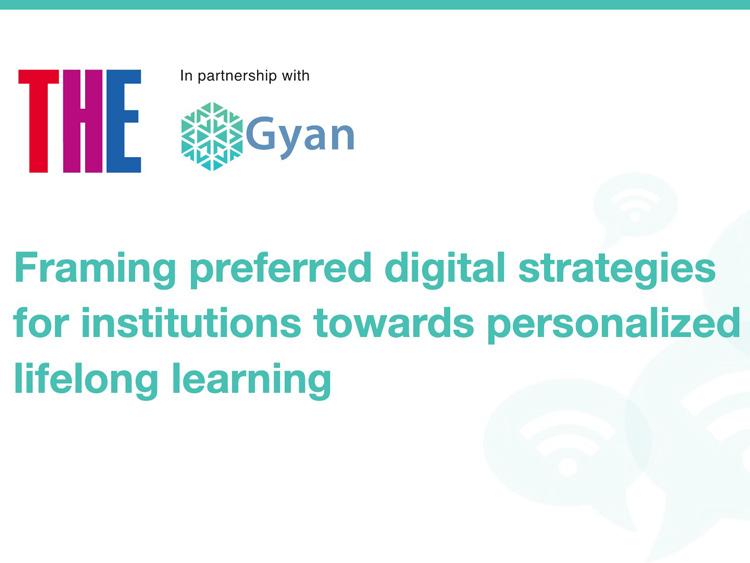Artificial intelligence can empower universities to identify and build the personalised lifelong learning paths that students are increasingly demanding.
At a Times Higher Education round table held at the THE World Academic Summit, sector leaders from around the world discussed how framing digital strategies can set institutions up to offer personalised lifelong learning. The round table was held in partnership with Gyan, an AI company that helps higher education institutions with skills extraction, course content discovery, course authoring, personalisation and open response assessment.
Vijay Kumar, senior adviser to the vice-president for open learning at Massachusetts Institute of Technology, said there was an “abundantly clear case” for universities to increase their lifelong learning offering.
“The spectrum of lifelong, non-traditional learners is huge and varied,” Kumar said. “We need to say, how can we create giant learning experiences for different kinds of people so that they can respond and equip themselves much better to the changing landscape around them?”
M. J. Bishop, vice-president for integrative learning design at the University of Maryland Global Campus, said AI tools could help quickly identify a university’s current offering, allowing the institution to create new content and credentials.
“Where the skill is being addressed in our content, where are we actually introducing skills, allowing students to apply them, giving students the opportunity to transfer them to new situations – that's a lot of work. So an AI engine could really be helpful in that regard – building that infrastructure, helping us understand how to connect the dots for our students and also for ourselves. That then can lead to alternative credentials and smaller, more modular content experiences,” she said.
Venkat Srinivasan, founder and chair of Gyan, said employers were pushing higher education institutions to respond to skills shortages and asked how automation could enhance the learning experience.
“Can we match the use of AI to meet the core need, which is, can you decompose learning into smaller units? Can you make learning itself more effective?” Srinivasan asked. “I think we don’t pay as much attention to the improvement in learning itself. Can you think about how people learn? Can you optimise the cognitive absorption of knowledge in ways that technology can enable and support?
Catherine Casserly, president and CEO of Casserly Consulting, said all parts of an institution’s “ecosystem” needed to consider how “we craft learning that really is representative for each person’s pathway”.
“How do we actually create these pathways and solve some of the problems for educators right now? Because they don’t have the time, because they need to focus on learning, but they need to curate a nice collection of curriculum and content,” Casserly said.
For any personalised learning module, it was first essential to agree on the learning outcomes, said Courtney Brown, vice-president for impact and planning at Lumina Foundation.
“One of the strategic challenges we have is increasing access to populations that would not normally have access and ensuring stackability so that, as you’re learning, you actually can be credentialed and it leads to quality employment,” Brown said. “If you look at learning outcomes, they are rarely aligned with employment outcomes.”
Farshida Zafar, director of Erasmus University Rotterdam, urged universities to demonstrate the value of AI tools to academic staff to ensure their engagement.
“Before you can actually introduce a tool such as this, it takes some time to demystify what you’re actually doing. It's not just about the boards making that decision, you also have a wider acceptance by teachers.”
The panel:
- Anant Agarwal, chief platform officer, 2U
- Thomas Auf der Heyde, provost and managing director, Jacobs University Bremen
- M. J. Bishop, vice-president for integrative learning design, University of Maryland Global Campus
- Courtney Brown, vice-president for impact and planning, Lumina Foundation
- Catherine Casserly, president and CEO, Casserly Consulting
- Hadiza Jummai Ramallan, head of open and distanced learning, National Universities Commission
- Vijay Kumar, senior adviser to the vice-president for open learning, Massachusetts Institute of Technology
- Alistair Lawrence, head of branded content, Times Higher Education (chair)
- Venkat Srinivasan, founder and chair, Gyan
- Agnes Toth, president and CEO, Budapest Metropolitan University
- Henrik Wegener, rector, University of Copenhagen
- Farshida Zafar, director, Erasmus University Rotterdam
Find out more about Gyan.


comment